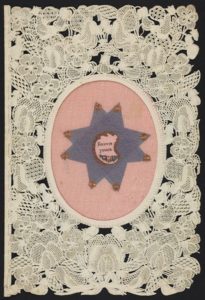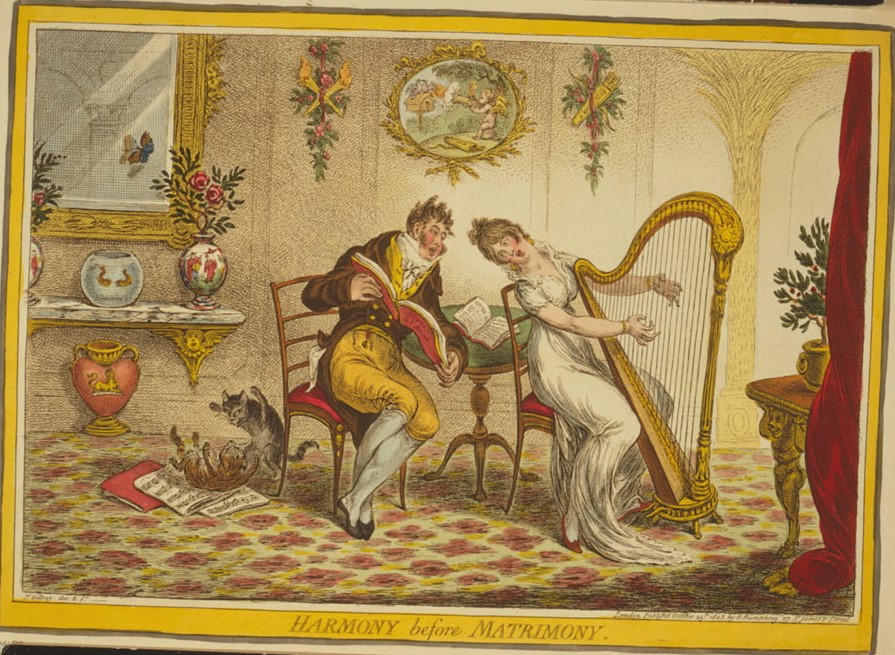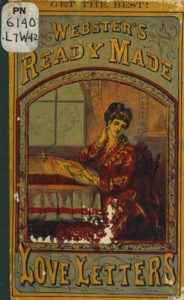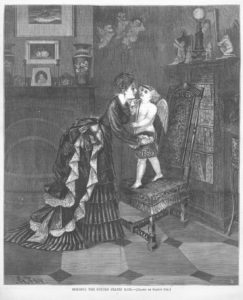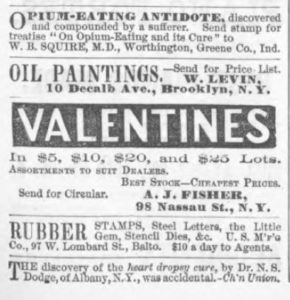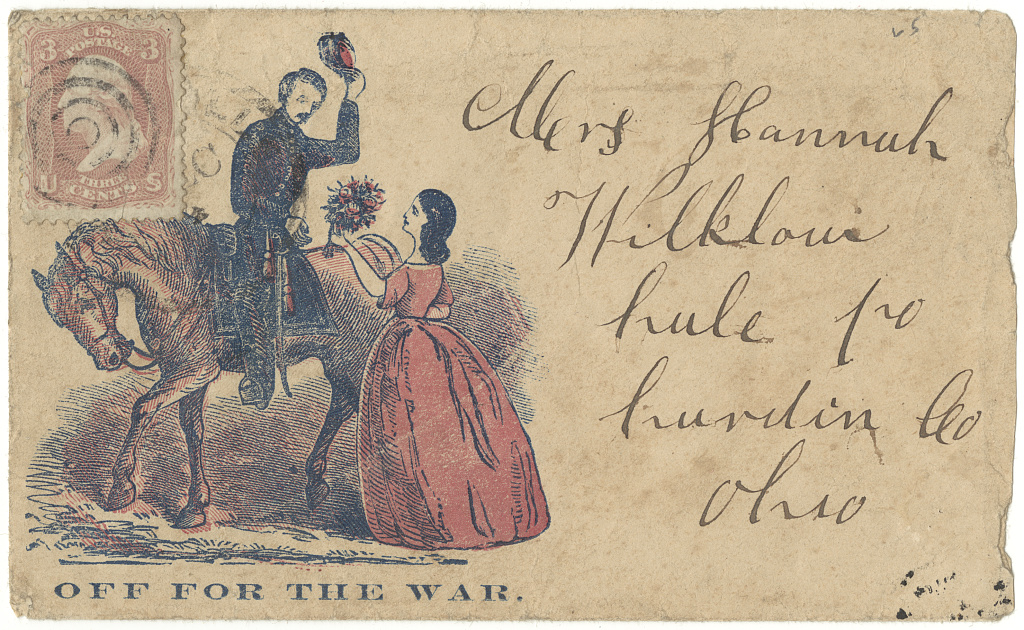From the February 1, 1873 issue of Harper’s Weekly:
MATCH-MAKING BY ADVERTISEMENT.
THERE is a paper in England devoted to the business of match-making by advertisement. It is called the Matrimonial News. In every number the reader may review some 350 candidates for marriage, and for one shilling an advertiser may describe his or her attractions, provided that the same be done in no more than forty words. Questions of difficulty or delicacy referring to courtship are answered gratuitously in these columns, privately for twelve stamps, personally for five shillings; a fee of five shillings is also required one month after any marriage brought about by this machinery. It is said that the business is bona fide, that confidence and secrecy are strictly observed, and, if the editor is to be believed, hundreds of marriages have resulted from his labors.
The modus operandi is this. The real name, address, and photograph of each candidate are deposited with the editor, the advertisement appears, and those who like correspond in the Matrimonial News, at first by numbers, like convicts: No. 6000 replies to Nos. 6007 and 6010, avowing that the particulars suit, and that he desires an exchange of photographs. This is done through the editor, who then, if both parties wish it, places them in direct private correspondence with each other, on condition of receiving a fee (amount not stated). Assuming that all this has occurred, it is probable that the first step taken is to ascertain that the personal appearance is equal to the photograph, and the second to cause their respective lawyers to inquire as to the fortune of the lady and the “ample private means” of the gentleman. For it is a most noteworthy fact, and one which extorts our admiration, that not only is fortune-hunting in these advertisements conspicuous by its absence, but that instances of extreme disinterestedness abound, so that men of “private fortune” or “ample means” expressly state that “money on the lady’s side is of no moment.” Out of nearly 200, not above twenty make it a necessary qualification.
The strangest part of the traffic presents itself the social position of the candidates. In one batch there are two noblemen, two colonels, a member of three learned societies, barristers, physicians, missionaries, squires with beautiful residences and good fortune, county magistrates, and numberless naval and military officers; a French lady of title, two English ditto, one having a jointure of £3000 per annum, two heiresses, whereof one is a ward in Chancery, entitled to large landed property on coming of age, some half a dozen of noble family or of ancient lineage; and above the rest in point of urgency is an application from a widow lady and her three daughters, all wanting husbands and having independent incomes. Surely this is, to say the least of it, very strange.
On another point a few words of warning seem needed. Certain of the candidates desire to correspond with too many of the other sex at once. Thus a bachelor, No. 6371, “desires to correspond” with no fewer than nine ladies; an Italian, No. 6421, with six; a medical man, No. 6456, with seven. The daughter of a deceased officer wishes to hear from eight gentlemen, and Emmeline, who is the offender in chief, wishes to correspond with as many as fourteen. Such a course of proceeding is hardly fair, nor is it promising of future happiness, for if the marriage accomplished proves unsatisfactory, the nucleus of regret, if not of discontent, is already formed. “If I had only taken 5423 instead of 6320,” he or she will say, “so should I have been blessed, whereas now,” etc. It is hardly to be supposed that of 350 weekly advertisers all represent impostures, and we are assured (though we remain doubtful) that detection and exposure are the results of any attempt at a hoax. If our men and women are so driven by circumstances that they can find suitable companions by no other method than this, so be it. Many there may be who marry in haste and regret at leisure; but, according to Congreve, there is a worse fate possible. In his play of The Old Bachelor are the following lines:
“Thus grief still treads upon the heels of pleasure—
Married in haste we may repent at leisure;
Some by experience find those words misplaced—
At leisure married, they repent in haste.”
A book published 150 years ago might have helped the matrimonial advertisers. Webster’s Ready-Made Love Letters begins with an overview of the courtship process and wedding etiquette and then proceeds to some love letter templates. None of the templates are explicitly intended for newspaper singles ads, but the first letter might have been useful with some modifications:
LETTER I.
From a Gentleman to a Lady whom he has seen but once.
HYDE PARK, May 3, 18—
Miss:
Prompted by an impulse which I cannot control, and impelled onward by a passion which overwhelms every other consideration, I have dared to address you with the hope, faint, yet deathless, that Fortune, which sometimes seconds a desperate resolve, may thus far favor me.
I acknowledge that, previous to yesterday, my eyes had never beheld you; but no sooner did you flash across my path than I felt enchained, enraptured, and experienced an instantaneous and vivid impression to which I had hitherto been a stranger.
I could not remain easy a moment longer without ascertaining your name and address. To accomplish this, I had the boldness to follow your footsteps, and for this and subsequent acts of temerity, I seek your pardon, and implore you to overlook the offence for the sentiment which occasioned it.
That I should be charmed at first sight by so fair a presence cannot be inconsistent in itself, or a matter of surprise to you; doubtless this is not the first instance by many of your having led the senses captive on the instant. It may, however, be the first time of your having been addressed under similar circumstances; so that, while others hesitate outside the barrier, I have entered the lists, and set my lance in rest.
For this display of eagerness and impetuosity, let me ask your forgiveness, and at the same time remind you that it is not altogether incompatible with real regard, which some suppose should be of slow and gradual growth.
I venture to assert, however, that in every case where two hearts are concerned, affection has had its birth in some instantaneous impression or sudden impulse. Esteem, respect, and regard, which accompany the tender passion, follow afterwards. The heart is first impressed with a hasty sketch, and the outline is at a later date filled in.
I trust, therefore, Miss, that although this communication emanates from one to whom you are unknown you will not conceive it to be wholly undeserving of notice; but that you may be induced to hold out some hope, however slight, and to favor me with a few words of reply, from which I may extract hope to animate me, and encouragement to persevere.
I have the honor to be, Miss,
Your devoted servant,
TO Miss —

